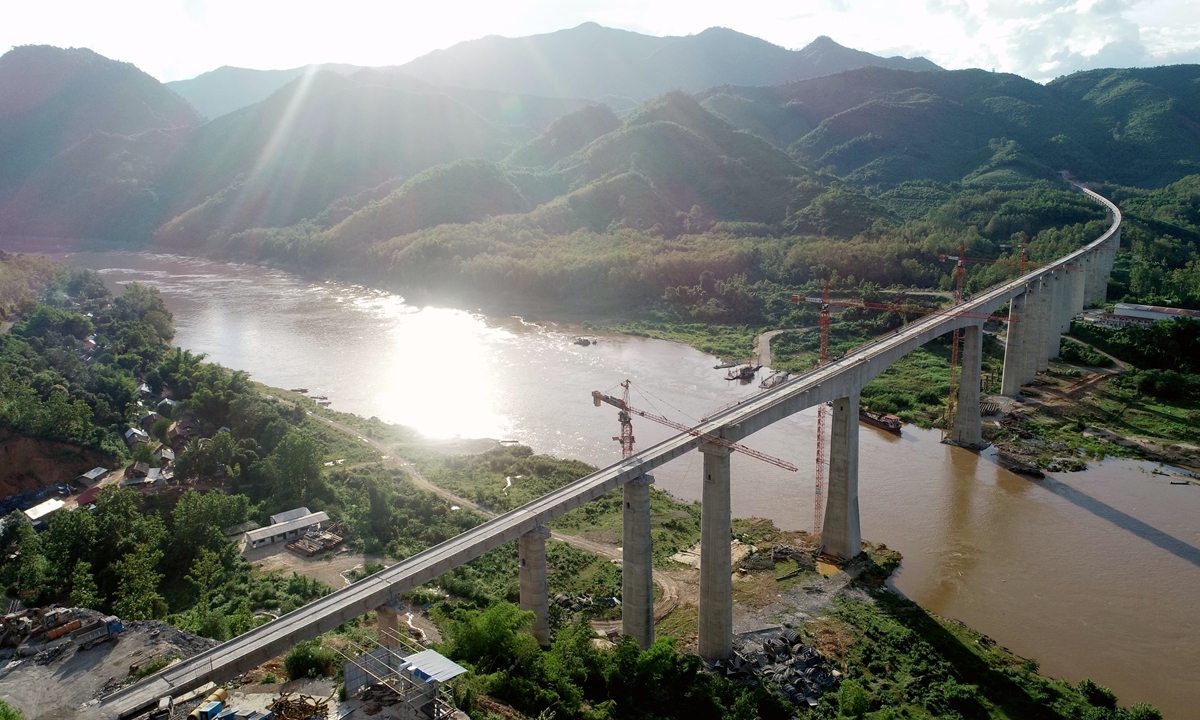Enhanced political trust key for Mekong countries to cope with challenges: Premier Li

The Mekong River section in Laos Photo: Xinhua
Chinese Premier Li Keqiang urged a closer connection and stronger political mutual trust among Mekong countries amid challenges, including the uncertain world economy and the still rampant COVID-19 pandemic at the 7th Greater Mekong Subregion (GMS) Leaders' Summit held on Thursday via video conference. Experts said political trust is the cornerstone of the GMS mechanism, warning that intervention from other countries remains a challenge but will not shake members' determination to cooperate.
The summit, chaired by Cambodian Prime Minister Samdech Techo Hun Sen, centered on the theme of strengthening partnership and coping with new challenges, focusing on high-priority sub-regional projects in the fields of traffic, energy, agriculture, tourism, and urban development.
China and Mekong neighbors are close as one family. Since it was established, the SMG mechanism has benefited economic, social development and livelihood improvements of countries that contributed to regional stability and prosperity, Li said, calling for strengthened political trust and wider areas of cooperation against worldwide uncertainties.
The GMS leaders' summit, generally held every three years, is considered the highest forum in the GMS mechanism which is an opportunity to examine how global trends are affecting the sub-region and what strategies should be made to tackle future challenges. It came with the launch of a development program in 1992 by the Asian Development Bank that brought together the six Asian countries of Cambodia, Laos, Myanmar, Thailand, Vietnam and China.
Over the past 30 years, China has been an important participant in GMS cooperation, contributing to its growth as well as regional prosperity and revitalization, the Chinese Foreign Ministry said on Thursday.
Observers said the GMS mechanism, with China's support, has the potential to promote the Mekong region as one of the world's fastest growing regions and an Asian economic frontrunner based on rich national resources.
However, some countries outside the region, especially the US, hope to squeeze into this area and exert their influence, thus creating many overlapping or even conflicting mechanisms, which may undermine the political mutual trust between China and other Mekong countries, Xu Liping, director of the Center for Southeast Asian Studies at the Chinese Academy of Social Sciences in Beijing, told the Global Times on Thursday.
"China should keep vigilant on the US' politicizing regional cooperation mechanisms and avoiding malicious competition with them," Xu alerted.
The US and Cambodia co-chaired the second Mekong-US Partnership ministerial meeting in early August. The US highlighted its $4.3 billion assistance to Mekong countries since 2009, a move that exposed Washington's anxiety on marshaling regional states against China's influence.
Li proposed six areas to enhance regional prosperity: deepening cooperation on water resources, strengthening mutual supports against COVID-19, heightening trade and investment, promoting connectivity via infrastructure, co-efforts in fighting climate change, and strengthening political mutual trust.
Regional joint efforts in the COVID-19 fight and vaccine development were widely seen as the most prominent achievements of the GMS mechanism over the past two years.
With a close connection with China on COVID-19 vaccines, Phnom Penh has become the capital city with the highest vaccination rate in the world. On Saturday, another 2.5 million doses of the Sinovac COVID-19 vaccine arrived in Cambodia, of which two million were purchased and 500,000 donated by the Chinese pharmaceutical firm and facilitated by the Chinese government, reported Phnom Penh Post.
Mekong countries were among the first to receive COVID-19 vaccine aid from China, as Premier Li promised at the third Lancang-Mekong Cooperation (LMC) leaders' meeting on August 24, 2020.
The Chinese Foreign Ministry on Thursday said that China will continue medical support to Mekong countries in COVID-19 screening, treatment and prevention.
Communication on water resources is also getting enhanced, as China has opened an information sharing platform and officially started sharing year-around hydrological data collected from the upper reaches of the Mekong River - known as the Lancang River in China - with downstream countries since November 2020.
Economically, Li called for a sooner ratification and implementation of Regional Comprehensive Economic Partnership (RCEP) among regional members to form a stronger and competitive industrial chain.
China also looks forward to working with Mekong countries to deepen border trade, speed up the construction of 5G, and jointly build an economic corridor with in-depth integration of transportation, logistics, commerce and industry, Zhao Lijian, the spokesperson of Chinese Foreign Ministry, said on Thursday.
Li concluded his remarks by stressing the need to safeguard the common interests of GMS countries and to always uphold multilateralism.
"Turbulent big power relations and an increasingly complex international order have made China realize that it needs a peaceful and stable environment for its development, and Mekong countries are friends that China can trust and rely on," Zhai Kun, a professor at the School of International Studies of Peking University, told the Global Times on Thursday.
China has always taken an active part in the framework of multilateral cooperation in the Mekong River region for a sustainable development, from GMS, and MRC, to the ASEAN-Mekong Basin Development Cooperation (AMBDC), Zhai noted.
China's role in the GMS is irreplaceable. China's support to the other five Mekong countries is consistent and unconditional, and will not collapse easily due to domestic government changes as some other countries do, said the expert.


